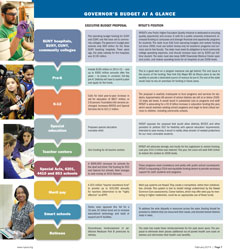NYSUT is advocating intensely for the resources and the full, equitable funding necessary for all children to have a strong foundation, including better access to quality early childhood education — namely universal full-day prekindergarten — and support services for students and families.
In the weeks ahead, union activists will ramp up their advocacy efforts at lobby days and at hearings to send the clear message that Albany must do more for students.
Lawmakers, union leaders say, must fix the inadequacies in Gov. Andrew Cuomo's proposed budget by correcting the inequitable funding system for public schools, restoring aid for public higher education, and amending the undemocratic tax cap.
Funding falls way behind

Cuomo's budget proposal once again asks New York's public colleges and universities to assume a leading role in the state's economic recovery on a shoestring, yet offers only flat funding to educate the state's next generation of creative thinkers and entrepreneurs.
State support for K-12 public education, meanwhile, has dropped over the past two years to its lowest levels since the late 1940s and, under the executive budget proposal, nearly 70 percent of school districts would begin school next year with less in state aid than in 2009-10.
"Underfunding and undervaluing public K-12 and higher education undermines our state's future," NYSUT President Dick Iannuzzi said.
Had New York merely increased state aid by the rate of inflation over the past five years, districts would have $2 billion more to support students and programs, a NYSUT analysis of state budget cuts shows.
By failing to even keep up with inflation, the state is thumbing its nose at the promise of fair and equitable funding levels from the 2007 Campaign for Fiscal Equity settlement, union leaders say. Including the Gap Elimination Adjustments that have shorted schools over the past several years, the state is now $5 billion behind what the CFE case determined was needed to meet its obligation to provide a sound, basic education to every child.
Last year, the Legislature made incremental gains in restoring funding levels, and scores of lawmakers this year have promised to support NYSUT's push for a $1.9 billion increase in education aid — more than double the governor's proposed $807 million.
"Every dollar possible must be funneled into New York's classrooms to help schools recover from this fiscal mess and make the real investments students and teachers need," said NYSUT Executive Vice President Andy Pallotta, who recently testified at a legislative budget hearing on K-12 education.
The governor's budget proposal includes feel-good tax cuts that deprive the state of revenue it needs to support education and other public services. The proposed tax cuts are extremely problematic because they are tied to the tax cap and would simply become another incentive for districts to cut program spending, Pallotta said.
Barbara Bowen, president of the Professional Staff Congress, which represents 25,000 faculty and staff at the City University of New York, said any budget surplus "should help to restore funds to SUNY and CUNY, not to provide tax breaks to corporations."
The governor's spending plan also proposes $20 million for a problematic merit pay program that would offer up to $20,000 to K-12 teachers earning "highly effective" ratings on their annual professional performance reviews. In addition to the fact that the ratings are invalid because they are tied to the botched implementation of the Common Core assessments, the union has long opposed merit pay schemes that encourage competition, rather than collaboration, among colleagues.
Use funding, not tuition
Fred Kowal, president of United University Professions, which represents
35,000 academic and professional
faculty at SUNY campuses, is dubious about several ambitious proposals to expand SUNY's online course offerings and to open a college
dedicated to emergency preparedness
and national security.
"I question how SUNY will pay for all the new initiatives when the governor proposes to keep funding levels flat," he said. "Where is the money for those initiatives coming from? Unfortunately, it will have to come from the students."
The governor's budget plan extends
only $69 million for the three SUNY teaching hospitals. Three years ago, the state subsidy for the hospitals
was $128 million. The hospitals, including the staff-depleted SUNY Downstate Medical, serve tens of thousands of low-income patients.
Community colleges, hailed by federal
and state governments for their partnerships with local businesses and their ability to help displaced workers, would also see flat funding of base aid, unless lawmakers act.
"Last year's increase in state funding allowed community colleges
to keep tuition increases to a minimum," said Ellen Schuler Mauk, chair of NYSUT's Higher Education Policy Council and a member of the NYSUT Board of Directors. "But this year, without the state's full share support, the costs will fall on our students and our counties."
Andy Sako, president of the Faculty Federation of Erie CC and a NYSUT Board member, also questioned the governor's failure to increase base aid to community colleges.
"It seems to be a contradiction to his ‘New York is Open for Business' campaign," he said. "Our community colleges are at the forefront of educating
students who will be needed to fill the opportunities at these new and expanding companies."
The governor's proposal also includes
the promise of $100 million next year to start a five-year phase-in of universal pre-K and a proposed bond act for $2 billion to fund technology
upgrades in schools and facilities development for the pre-K program.
"We have a few weeks to work with our allies in the Legislature to fix this budget," said Pallotta. "With the support we've seen so far, we have a great start."
Lawmakers must pass a state budget by April 1.
TAKE ACTION
Become an e-activist and tell lawmakers to support public K-12 and higher education. It’s easy. Just visit NYSUT’s Member Action Center at mac.nysut.org.